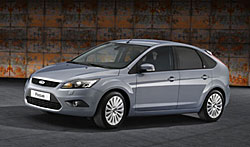 |
| The new European version of the Ford Focus will be the first vehicle launched as an ECOnetic model. |
These cars will use a combination of the latest common-rail diesel powertrains together with other carefully-selected features engineered to reduce CO 2 emissions to the absolute minimum. The first to be launched by the end of 2007 will be the Ford Focus ECOnetic, which promises to deliver best-in-class CO 2 emissions for conventional powertrain technology at just 115g/km.
"Although all of our current European models are already highly competitive in terms of CO 2 , we do know that more and more car buyers seek the lowest possible emissions as a key 'why-buy?', and that they have an increasing range of such vehicles to choose from in the market," said John Fleming, Ford of Europe President and CEO.
"By launching specific models, with dedicated Ford ECOnetic badging, which achieve ultra-low CO 2 results, we will give a clear alternative to those customers who prioritize low emissions performance in their purchasing decision.
"We chose the Ford ECOnetic name because it links ecologically friendly technology to our kinetic design 'energy in motion' philosophy for both driving quality and emotional styling," Fleming added. "Above all, it assures our customers that these models will not sacrifice any of the driving dynamic qualities they have come to expect from Ford, even though ultra-low emissions have been prioritized."
Ford Focus ECOnetic: Class Leading Emissions
The Ford Focus ECOnetic will be available early in 2008, and will demonstrate that very favorable fuel consumption levels and significantly reduced CO 2 emissions can both be achieved using conventional drive technology, coupled with a clever combination of individual, fuel-saving measures.
The new Ford Focus ECOnetic, powered by the highly efficient 109PS, 1.6-litre Duratorq TDCi engine with standard Diesel Particulate Filter, delivers an average fuel consumption of just 4.3 l/100km, which corresponds to an average CO 2 emission of only 115g/km.
"The challenge for the engineering team was to deliver the maximum reduction in CO 2 using available and affordable technologies," said Gunnar Herrmann, Ford's Vehicle Line Director for medium cars. "The result of this detailed work is both a class-leading result for a vehicle with state-of-the-art conventional power train technology, and some useful learnings that we can also apply to all diesel models in the Focus range over time."
The starting point for achieving these results was to reduce drive resistances and improve aerodynamics. By lowering the vehicle, adding an aerodynamics kit and using 195/65R15 tyres a very good coefficient of drag (cd) of 0.31 is achieved.
A further measure to reduce driving resistance also being used for the first time in the Ford Focus ECOnetic is the introduction of new low-viscosity transmission oil developed by Ford's fuel partner BP. Under testing, the efficiency benefits were found to be so significant that this new BP transmission oil is to be introduced across other Ford products in the C and CD segments.
In adding the new Ford ECOnetic diesel derivatives to its extensive product line-up, the company will offer customers clear and affordable choices for environmentally friendly cars.
Ford of Europe is a leader in Flexifuel technology, which uses re-generative energy sources produced from renewable biomass. The Ford Focus and the Ford C-MAX are already available as Flexifuel models which can be fuelled with bio-ethanol E85 (a blend of 85 percent bio-ethanol and 15 percent petrol), or on petrol, or on any mixture of both fuels in one tank, as an alternative to conventional petrol technology only.
The combined use of bio-ethanol as a fuel and Ford's Flexifuel technology can reduce total life cycle CO 2 (greenhouse) emissions by between 30 and 80 per cent, without compromise to performance and driving quality. From early 2008, Flexifuel versions of the new Mondeo, the Ford Galaxy and the Ford S-MAX will also be on sale, giving Ford one of the broadest ranges of Flexifuel vehicles available in Europe.
In some European markets, Ford also offers selected models converted to run on LPG (Liquefied Petroleum Gas) and CNG (Compressed Natural Gas). These models are available in countries like Germany and Austria, where the infrastructure is available to support customers who choose this option.
"Whichever model our customers choose - Ford ECOnetic, Flexifuel, LPG or CNG - they can be assured of affordable, practical, low-CO 2 technologies that will also retain our trademark qualities of excellent driving dynamics and dependability throughout the lifetime of the vehicle," Fleming said.
"There is no single catch-all solution on the horizon to make mobility more sustainable, but Ford is committed to continue working on a portfolio of environmentally advanced vehicles and technologies to maintain momentum. The Ford ECOnetic range takes us another step along this journey, and will make our portfolio even broader," he added.

